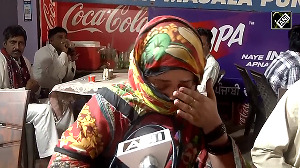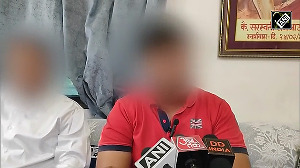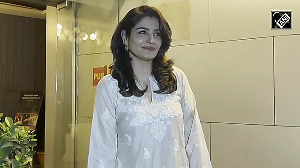I am not a liar," declares 22-year old Murali K Thalluri, maker of the controversial Australian high school suicide film, 2:37. "But, no matter what I say, some people in Australia just won't believe me."
Perhaps they cannot understand how someone who is just about 20 could have started on a very serious film and complete it in less than two years.
Thalluri is speaking out in Toronto, where his riveting, miniscule budget film -- a Cannes Film Festival favourite a few months ago -- is having its North American premiere. Some publications in Australia have accused him of inventing the suicide story to sell the film. "I made it with just one purpose in mind," the self-trained filmmaker says. "I wanted my audiences to know how awful, degrading and selfish suicide is. I want to save lives and feel passionate about it because I have tried to kill myself."
 But the film is not autobiographical. "I have merely taken many things that have happened to my friends," he explains, "my acquaintances and myself and re-imagined them for the movie."
But the film is not autobiographical. "I have merely taken many things that have happened to my friends," he explains, "my acquaintances and myself and re-imagined them for the movie."
The story takes place in the course of a seemingly normal school day. Naturally, no one but one person expects a tragedy to occur at 2:37 p.m.
His critics do not believe the Adelaide-based Thalluri, son of immigrant physicians, tried to kill himself by mixing whiskey with eye medication (he was mugged when he was 15). The attempt was unsuccessful. Thalluri remembers that even as the drugs and whiskey were working on him and he felt he was dying, he had the sudden, inexplicable urge to live. He had tried to kill himself because he was worried about his health, depressed following a break-up with his girlfriend and immensely bored with his work as a tax official.
"I wanted to live," he says, speaking softly and looking at the reporter with his left eye, as most of his right eye has been severely damaged following the mugging. "I have shown hospital records to the press, but those who are accusing me of lying just don't want to take the evidence seriously."
They are asking for the tape a friend sent him before cutting his wrists. "I showed the tape to a Justice of Peace," he continues. "But I cannot give the tape to the media. The family is too distraught and finds it difficult to imagine that life has ended for someone very young and dear to them. I don't want to inflict any more wounds on them."
He received the videotape two days after the friend had slit the wrists. And, despite feeling horrible about his friend's death, he set out to kill himself a few weeks later.
Strangely, despite the urge to live, he felt perversely powerful while consuming the whiskey and drugs. " I didn't feel weak doing what I was about to do," he says, shaking his head as if in disbelief. "Quite the opposite, actually. I felt strong. I finally thought I had power over something. I had the power to take my own life."
He shared the facts about his friend's suicide and his own attempt with the media more in an effort to send out the word that the heroism some people may feel at the moment of suicide is deceptive. "As life is ebbing or horribly ending, I am sure practically everyone wishes he or she could get the gift of life," he adds. "I sometimes wonder if these controversies would have resulted had I not revealed my own past." But how could he have avoided that? "People were bound to ask questions, as to who I was, how I taught myself filmmaking and who my parents are."
When the controversies broke out, soon after the film was unveiled at Cannes and then shown as the inaugural film at the Melbourne Film Festival, Thalluri was afraid his parents -- Rajkiran and Jyoti -- would be besieged by the media. "I have caused them enough grief, though they have been as steady as a rock for me," he continues, his voice choking. "I didn't want them to get involved in the controversy and asked them not to comment on anything."
Made for less than $1 million, the film was backed by private individuals. "I went to many government agencies, but they said I was too young to make a film," he says, chuckling. "I believed in perseverance. And after my suicide attempt, I was stronger and more determined."
The film has since been sold to more than 25 movie territories, including Canada.
"I call it the film that saved my life," Thalluri continues, adding that each day people have found a way to send him notes saying how their lives have been touched and changed by the film. Some have lost their dearest ones to suicide, he says, some have been thinking of killing themselves, and others are recovering from suicide attempts.
He hopes his film will be a reminder to parents across the world not to take their children for granted. Parents and children should not be afraid of discussing the serious issues facing children. If they cannot resolve the issues, they ought to go to counsellors. "My ultimate hope is that the film will save many more lives," says the young filmmaker.





